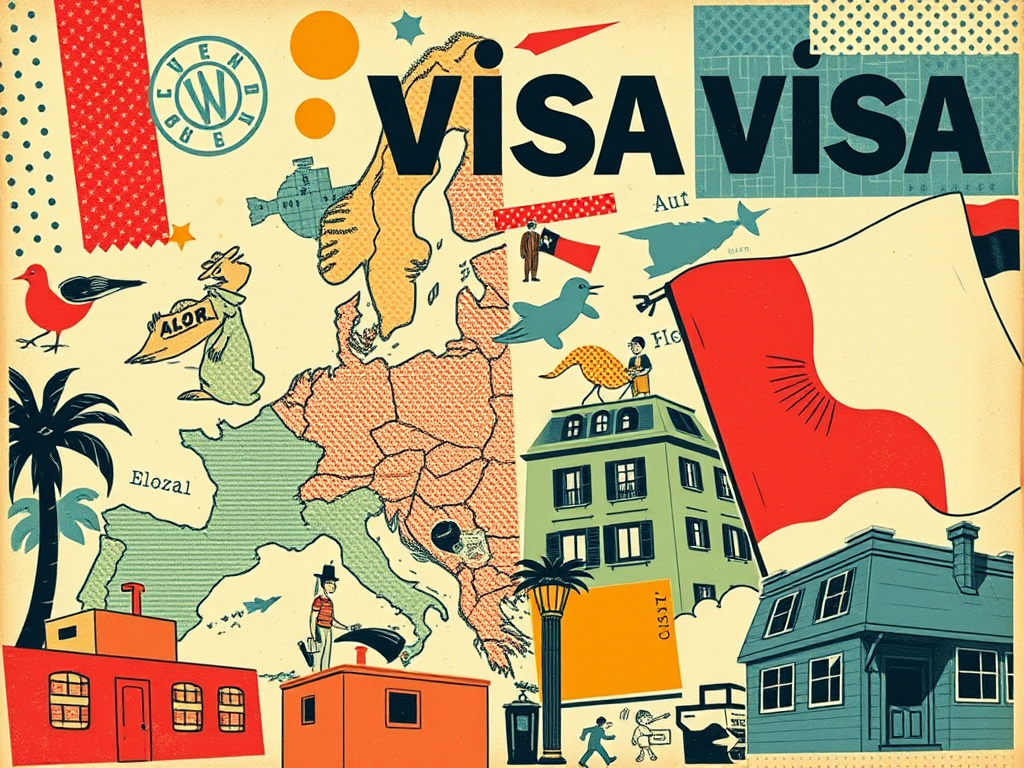
Latin American Investors and Greece: Is the Golden Visa on Their Radar?
Table of Contents:
- Introduction
- Understanding the Greek Golden Visa Program
- Latin American Investment Trends
- The Appeal of Greece for Latin American Investors
- Economic Impact of Golden Visa Investments
- Challenges and Considerations
- Future Outlook
- Conclusion
- FAQs
Reading time: 15 minutes
1. Introduction
As global investment patterns continue to evolve, an intriguing trend is emerging: the growing interest of Latin American investors in European real estate markets, particularly in Greece. This comprehensive analysis delves into the intersection of Latin American capital, the Greek property market, and the allure of the Golden Visa program. We’ll explore the economic drivers, potential benefits, and challenges that shape this emerging investment landscape.
The Greek Golden Visa program, launched in 2013, has become a focal point for international investors seeking both lucrative real estate opportunities and a pathway to European residency. While Chinese and Middle Eastern investors have traditionally dominated this space, there’s a noticeable uptick in interest from Latin American high-net-worth individuals and families. This shift raises important questions about changing global investment patterns, the attractiveness of Greek assets, and the broader implications for both the Greek and Latin American economies.
2. Understanding the Greek Golden Visa Program
The Greek Golden Visa program is a residency-by-investment scheme that offers non-EU nationals the opportunity to obtain a residence permit in Greece through strategic investments. The program has gained significant traction since its inception, attracting billions of euros in foreign direct investment.
Key Features of the Greek Golden Visa:
- Minimum investment threshold: €250,000 in real estate
- Residence permit validity: 5 years, renewable
- Family inclusion: Spouse, children under 21, and parents of the main applicant
- Visa-free travel: Access to the Schengen Area
- Path to citizenship: Possibility after 7 years of residency
The program’s relatively low investment threshold, compared to similar schemes in other EU countries, has made it particularly attractive to investors seeking European residency options. For Latin American investors, this presents an opportunity to diversify their portfolio geographically while securing a foothold in the European Union.
3. Latin American Investment Trends
To understand the potential impact of Latin American investors on the Greek Golden Visa program, it’s crucial to examine broader investment trends from the region. Latin American economies have experienced significant volatility in recent years, prompting high-net-worth individuals to seek stable investment opportunities abroad.
Driving Factors for Outbound Investment:
- Political instability in several Latin American countries
- Currency devaluation and inflationary pressures
- Desire for portfolio diversification
- Seeking safe-haven assets in more stable economies
These factors have led to an increase in capital outflows from Latin America, with real estate in stable markets becoming an increasingly popular choice. The United States, particularly cities like Miami, has traditionally been a primary destination for Latin American real estate investment. However, European markets, including Greece, are now capturing a growing share of this capital.
4. The Appeal of Greece for Latin American Investors
Greece offers a unique value proposition for Latin American investors, combining the allure of European residency with attractive real estate opportunities. Several factors contribute to Greece’s appeal:
Economic Recovery and Growth Potential:
After years of economic challenges, Greece has shown signs of recovery and growth. The real estate market, which experienced significant price corrections during the crisis, now presents opportunities for value appreciation. For Latin American investors accustomed to volatile markets, the prospect of entering a recovering market with growth potential is particularly attractive.
Cultural and Lifestyle Appeal:
Greece’s rich history, Mediterranean lifestyle, and cultural similarities with Latin America make it an appealing destination for investors seeking a second home or retirement option. The country’s high quality of life, coupled with its relatively lower cost of living compared to other Western European nations, adds to its attractiveness.
Strategic Location:
Greece’s position as a gateway to both Europe and the Middle East offers strategic advantages for business-minded investors. The country’s developed infrastructure and improving business environment provide a solid foundation for those looking to expand their commercial interests into new markets.
Real Estate Market Dynamics:
The Greek real estate market offers a diverse range of investment options, from urban apartments in Athens to luxury villas on the islands. The availability of houses for sale in athens and other prime locations at competitive prices compared to other European capitals is a significant draw for international investors.
5. Economic Impact of Golden Visa Investments
The influx of foreign investment through the Golden Visa program has had a notable impact on the Greek economy, particularly in the real estate sector. As Latin American investors increasingly participate in this program, it’s important to assess the potential economic implications:
Real Estate Market Stimulation:
Golden Visa investments have contributed to increased demand in the Greek property market, particularly in prime locations. This has led to price appreciation in certain segments, benefiting both developers and existing property owners. The entry of Latin American investors could further stimulate this trend, potentially leading to more diverse and dynamic market conditions.
Job Creation and Economic Activity:
The real estate investments associated with the Golden Visa program have spurred construction activity and related services. This has led to job creation in various sectors, including construction, real estate services, and hospitality. An increase in Latin American investment could potentially create new business opportunities and partnerships between Greek and Latin American enterprises.
Foreign Direct Investment (FDI) Boost:
The Golden Visa program has been a significant source of FDI for Greece. As Latin American investors become more active in this space, it could lead to a diversification of FDI sources, reducing dependence on traditional investor markets like China and the Middle East.
6. Challenges and Considerations
While the Greek Golden Visa program presents attractive opportunities for Latin American investors, there are several challenges and considerations to be aware of:
Regulatory Environment:
Navigating the Greek regulatory landscape can be complex for foreign investors. Issues such as property ownership restrictions in border areas and bureaucratic processes may pose challenges. Latin American investors will need to carefully research and potentially seek local expertise to ensure compliance with all relevant regulations.
Market Saturation Concerns:
As the Golden Visa program attracts more investors, there are concerns about potential market saturation in popular investment areas. This could impact future price appreciation and rental yields, particularly in prime locations that have seen significant foreign investment.
Political and Economic Stability:
While Greece has shown signs of economic recovery, investors must remain mindful of potential political and economic volatility. The country’s debt levels and ongoing economic reforms may impact the investment landscape in the coming years.
Currency Risk:
For Latin American investors, currency fluctuations between their home currencies, the euro, and potentially the US dollar (often used as an intermediary currency) can impact investment returns. Careful financial planning and potentially currency hedging strategies may be necessary to mitigate these risks.
7. Future Outlook
The potential increase in Latin American investment in the Greek Golden Visa program could have several implications for the future:
Diversification of Investor Base:
An influx of Latin American investors could lead to a more diverse investor base for the Greek real estate market. This diversification could potentially bring new perspectives, investment strategies, and business practices to the Greek market.
Evolution of the Golden Visa Program:
As the program attracts a wider range of international investors, there may be pressure to evolve and adapt the program’s terms and conditions. This could lead to changes in investment thresholds, eligible investment types, or residency requirements.
Cultural and Economic Ties:
Increased investment from Latin America could foster stronger cultural and economic ties between Greece and Latin American countries. This could potentially lead to increased trade, tourism, and cultural exchange between these regions.
Market Innovations:
The entry of Latin American investors might spur innovations in the Greek real estate market, such as new development concepts, marketing strategies, or property management approaches tailored to international investors.
8. Conclusion
The growing interest of Latin American investors in the Greek Golden Visa program represents a fascinating intersection of global investment trends, migration patterns, and economic opportunities. While still an emerging trend, it has the potential to significantly impact both the Greek real estate market and the broader economic landscape.
For Latin American investors, Greece offers a unique combination of European residency, attractive real estate opportunities, and the potential for portfolio diversification. However, careful consideration of the challenges, including regulatory complexities and market dynamics, is essential for successful investment strategies.
As this trend develops, it will be crucial for both Greek policymakers and real estate professionals to adapt to the needs and preferences of this new investor demographic. Similarly, Latin American investors will need to develop a deep understanding of the Greek market to capitalize on its opportunities while navigating its unique challenges.
The evolution of this investment trend could lead to stronger economic and cultural ties between Greece and Latin America, potentially opening new avenues for cooperation and exchange. As the global investment landscape continues to shift, the Greek Golden Visa program’s ability to attract diverse international investors, including those from Latin America, will be a key factor in its ongoing success and impact on the Greek economy.
FAQs
1. How does the Greek Golden Visa compare to similar programs in other European countries?
The Greek Golden Visa program is generally considered more accessible due to its lower investment threshold (€250,000) compared to countries like Spain (€500,000) or Portugal (€350,000 – €500,000). It also offers a relatively straightforward application process and does not require physical residence in Greece to maintain the visa.
2. Are there any restrictions on the types of properties Latin American investors can purchase under the Golden Visa program?
While there are no specific restrictions based on investor nationality, there are general rules about property purchases in Greece. For example, properties in border regions may require additional permissions. It’s advisable for investors to work with local legal experts to ensure compliance with all regulations.
3. How might currency fluctuations impact Latin American investments in Greek real estate?
Currency fluctuations can significantly impact investment returns. Latin American investors may face risks related to the exchange rates between their home currency, the euro, and potentially the US dollar. Implementing currency hedging strategies or timing investments based on favorable exchange rates can help mitigate these risks.
4. What are the potential tax implications for Latin American investors in Greek property?
Investors may be subject to various taxes, including property transfer tax, annual property tax, and potential rental income tax. Double taxation agreements between Greece and the investor’s home country may affect tax liabilities. It’s crucial to consult with tax professionals familiar with both Greek and the relevant Latin American tax systems.
5. How might increased Latin American investment influence the future of the Greek Golden Visa program?
Increased diversity in the investor base could lead to program adaptations to better suit a wider range of investors. This might include changes in investment options, application processes, or even the introduction of new benefits. It could also lead to enhanced economic and cultural ties between Greece and Latin American countries, potentially influencing trade and diplomatic relations.

Article reviewed by MDavid Cohen, Chief Strategy Officer | Architect of Scalable Growth for Tech Startups, on March 29, 2025


